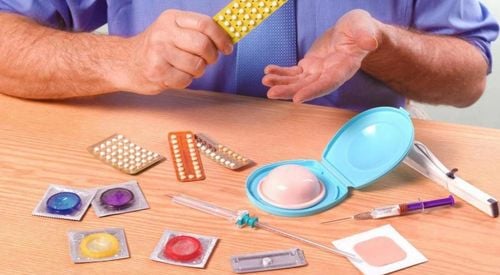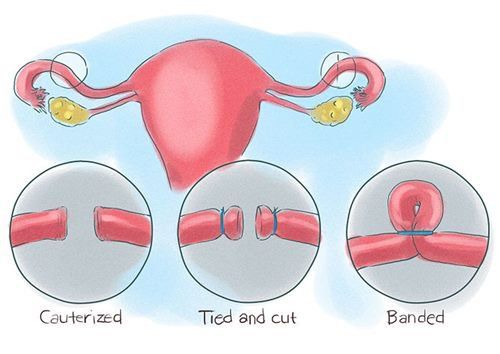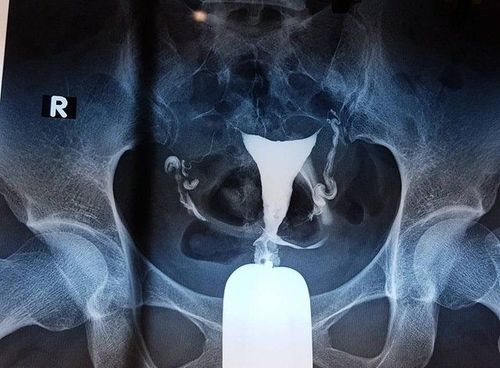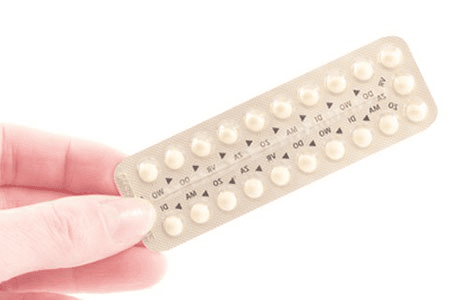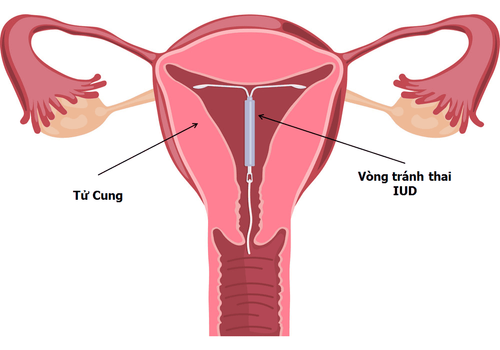This is an automatically translated article.
In order to ensure the health of the mother in the postpartum period and at the same time let the family have enough time to take good care of the new baby, most postpartum women always wonder how to prevent pregnancy during the postpartum period. this. Therefore, equipping yourself with knowledge about safe contraceptive methods after giving birth is extremely necessary and useful so that you can rest assured to take care of your baby, recover your health after giving birth as well as maintain family happiness. family.
1. How long after giving birth is the best time to get pregnant again?
For about two years after giving birth, especially a cesarean section, women should not become pregnant again, because this is the recovery period of the uterine muscles to avoid affecting the health of mother and baby.
During pregnancy, estrogen and progesterone are always maintained in higher than normal concentrations to nourish the uterine lining, ensuring an ideal environment for the fetus to grow and develop. From there, it will lead to inhibiting the ovulation process, menstruation does not appear during this period and when having sex, there will be no pregnancy.
After giving birth, the hormones in the mother's body will gradually return to normal, depending on the location of each pregnant woman plus the conditions of care and breastfeeding, the menstrual cycle will be different. The appearance of menstruation indicates that ovulation has returned and pregnancy is possible. If you don't want to get pregnant right away, it's a good idea to take some safety precautions while having sex when your period starts again.
2. The principles of contraception
It is necessary to understand the reliability and effectiveness of contraceptive methods to choose the right method, and at the same time it is necessary to understand how it works so as not to make mistakes leading to unintended results.
No method of contraception is 100% effective and one method may be more effective than another depending on the location.
3. Safe birth control measures for women after giving birth
3.1 Breastfeeding amenorrhea Breastfeeding amenorrhea is a nursing mother's milk that increases prolactin levels. When prolactin rises in the blood, it prevents ovulation and prevents pregnancy. Women who are exclusively breast-feeding and breast-feeding often do not ovulate for at least 6 months after childbirth, and if breastfeeding continues for 12 months postpartum, pregnancy can be prevented during this time.However, the points to note about this method are:
The rate of pregnancy when using this method is still very high, it is a temporary method before applying safer and more effective methods of contraception. . Only effective in the first 6 months after birth and ensure exclusive breastfeeding. Breastfeeding even though mother or baby is sick. 3.2. Using a condom Using a condom is a highly effective method of contraception, reaching 85% - 97% if applied correctly. Next to condoms is a measure to prevent sexually transmitted diseases. Condoms should be used whenever you have sex.
Points to note:
Carefully check condoms before use for integrity, expiry date printed on the package. Use a new, intact condom every time you have sex. Read the instructions for use carefully for best results.
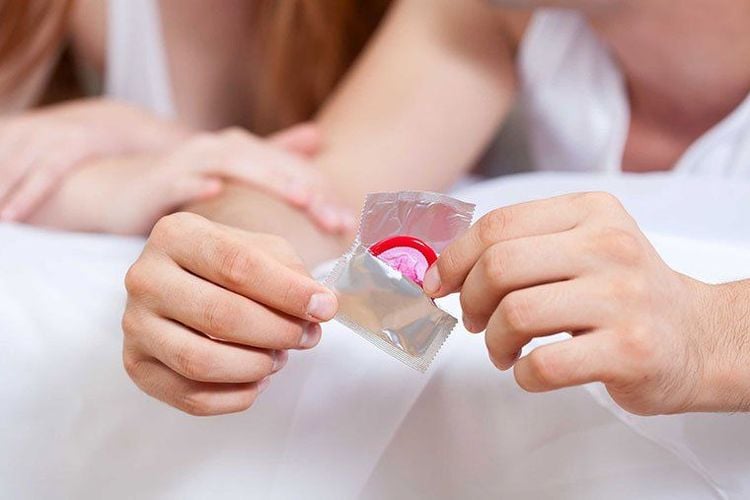
Phụ nữ sau sinh ngừa thai an toàn với bao cao su
When to use the drug after giving birth: Immediately after having milk or any time, but make sure that you are not pregnant.
Points to note:
Take according to the doctor's instructions, one pill per day in the direction of the arrow on the pack, use the next pack immediately after the previous pack is finished, there is no time to stop taking the drug. If you forget to take a pill, then when you remember, take 1 pill immediately and continue taking the next dose every day as usual and use extra contraception such as condoms for the next 2 days. This method of birth control does not prevent sexually transmitted diseases. Some side effects when taking the drug such as no period, less menstrual blood or prolonged menstrual period. In addition, there may be symptoms such as headache, chest tightness, lower abdominal pain... 3.4. DMPA Injectable Contraceptive Pill Intravenous contraceptive method by injection, the drug is put into the body and releases the hormone progestin and inhibits ovulation, no ovulation means no pregnancy, besides reducing The secretion of mucus in the female cervix, creating an unfavorable environment so that sperm cannot reach the fallopian tubes and carry out the fertilization process.
This is a temporary method of contraception, but its effectiveness is quite high and is currently being prioritized for use.
When to use this method:
6th week postpartum if breastfeeding. If you have passed the breastfeeding stage, you can inject at any time, but make sure you are not pregnant at that time Notes when using injectable contraceptives:
Inject on time as scheduled by the staff. medical. Oral contraceptives do not prevent sexually transmitted diseases. After the injection, there will be some menstrual disorders. But if vaginal bleeding is frequent and continuous, you need to see a doctor right away. 3.5. IUD - Intrauterine Device is a T-shaped device, this is an invasive method of contraception because it is inserted into your uterus. to avoid pregnancy. The main mechanism is to prevent sperm from meeting the egg to form an embryo.
The contraceptive effectiveness of the IUD is very high, according to many studies, more than 99% effective
When to put the ring:
Depending on your health at that time, it is best to see and doctor will advise you a most suitable time. For postpartum women after 4 weeks, the ring can be inserted when the health is stable and there is no postpartum infection.

Đặt vòng tránh thai là phương pháp ngừa thai an toàn cho phụ nữ sau sinh
Points to note after IUD insertion:
Contraceptive effectiveness ranges from 5 to 10 years (depending on the type of IUD and the pills contained in the ring). You will be consulted with many different types of rings and depending on your needs to decide which ring is best for you. Regular check-ups by appointment. May cause some menstrual disorders after IUD insertion, but it is not significant and does not affect your health. The downside of this method is that it does not prevent sexually transmitted diseases. 3.6. Contraceptive stick The contraceptive implant is a plastic rod, containing hormones inside, and the way to use it is to implant under the skin of the arm. This hormone when entering the body has the effect of inhibiting ovulation, making the endometrium thinner and thickening cervical mucus, preventing the penetration of sperm and the implantation of a fertilized egg. Time of implantation : Depending on your health at that time, it is best to examine and your doctor will advise you on a most appropriate time.
Points to note after implantation:
Some local effects when implanting: bleeding, allergic reaction, implant displacement, infection at the implant site... This is a temporary contraceptive, when If you withdraw the stick or after the expiry date without any other method of contraception, you are completely pregnant again. Some changes are common in the first few months after implantation: Headache, acne, weight gain, breast engorgement, mood changes. Changes in menstruation: most of you will have fewer days and sometimes no period 3.7. Female sterilization Sterilization is a permanent and irreversible method of birth control, very effective over 99%. The mechanism of female sterilization is to make the fallopian tubes blocked or sealed to prevent the egg from meeting the sperm and fertilizing it.
Time of sterilization after giving birth: After giving birth and there is no need to get pregnant, you can ask your doctor to perform sterilization within the first 7 days after giving birth or later up to 6 weeks after giving birth. Currently, a sterilization method that is being used commonly is a combination of sterilization during cesarean section to reduce the number of procedures performed on pregnant women.
Points to note:
Make sure you have had enough children and have no need to become pregnant again Sterilization does not prevent STIs After sterilization you still have normal periods and do not affect the ability to have sex. Vinmec International General Hospital is one of the hospitals that not only ensures professional quality with a team of leading doctors, modern equipment and technology, but also stands out for its examination and consulting services. and comprehensive, professional medical treatment; civilized, polite, safe and sterile medical examination and treatment space.
Please dial HOTLINE for more information or register for an appointment HERE. Download MyVinmec app to make appointments faster and to manage your bookings easily.





